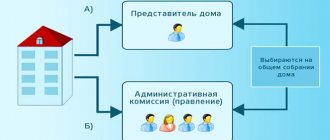What is trust management of property
Let's say you got an apartment from your grandmother in another city, for example in Saransk.
You want to hand it over. But you don’t have time to go there, look for tenants, sign an agreement, or control the payment of housing and communal services. You can entrust this to a trustee for a small (or large - as you agree) fee. The law allows the Civil Code of the Russian Federation, Article 1012. Property trust management agreement to transfer property into trust management and obliges the trustee to act in your interests. This person can perform any legal and actual actions on your behalf, unless you limit his powers in the contract.
The peculiarity of trust management is that the agreement is not concluded for one-time transactions with property, but for managing it over a long period of time.
Yulia Kislyakova, lawyer at the European Legal Service
Trust property management
An agreement under which the right to manage property is transferred to an appointed person for a specific period is defined by lawyers as a special agreement for trust management of property.
Such a document is considered official and requires strict implementation. It begins to operate from the time the property is transferred to the appointed trustee.
The terms of the property trust management agreement are paid.
An important condition of such a document is the amount of the bonus to the trustee. The document will not be considered executed if the payment system for the required remuneration is not agreed upon.
In principle, there are no special obstacles to concluding a gratuitous contract. However, all conditions must be specified in the contract; they are indicated in a separate paragraph.
The content of a property trust management agreement must necessarily include rules prescribing the relationship between the principal and the manager. The resulting legal relations can simultaneously relate to several beneficiaries.
The property trust management agreement is based on a specific legal framework. Each lawyer understands it differently. Very often, lawyers try to discover a “material legal substrate” in the existing trust management. As a result, they begin to qualify the agreement of trust management of property as a semblance of a certain instance of property law.
Such attempts amount to ignoring civil law, which is divided into two groups:
- Real;
- Required.
What can be transferred to trust management
Law of the Civil Code of the Russian Federation, Article 1013. An object of trust management allows the following to be transferred to trust management:
- Enterprises, property complexes and other real estate objects.
- Securities, including those whose rights are recorded in an electronic register and not on paper.
- Exclusive rights to the result of intellectual activity or to a means of individualization (brand, name, trademark, product line, etc.).
- Other property - what exactly it is - is not specified in the law.
Now in Russia, trust management of property is more often used in the areas of leasing commercial real estate and disposing of securities.
Contents of the property trust management agreement
Responsibilities of the trustee (Article 1020 of the Civil Code of the Russian Federation):
- exercises the powers of the owner in relation to property transferred to trust management (disposition - in cases provided for by the trust management agreement);
- provide the management founder and beneficiary with a report on its activities within the time frame and in the manner established by the property trust management agreement;
- when acting on his own behalf, it is imperative to indicate that he is a manager (orally or when signing written documents).
The trustee has the right:
- to protect the rights to property held in trust, demand the elimination of any violation of his rights (Articles 301, 302, 304, 305);
- demand remuneration provided for in the property trust management agreement, as well as for reimbursement of the necessary expenses incurred by him during the trust management of property, at the expense of income from the use of this property.
Why transfer property to trust management?
If you answer literally - to make your life easier.
For example, if you do not live in an apartment, someone should periodically check that everything is in order, that there are no leaks, that the windows and doors are intact, and that there has been no theft. It is necessary to transfer meter readings to the management company, pay for utilities, and see if there are any registered letters from the tax office or the Pension Fund in the mailbox.

Let’s say the owners of other apartments decided to hold an extraordinary meeting regarding repairs in the entrances, fencing the territory, and the disposal of the common property of the apartment building. Your vote may be decisive, and you have not left anyone with a power of attorney to vote.
Denis Rumyantsev, managing partner of the Goodman Estate real estate agency
Rumyantsev notes that the trustee will deal with the issues listed, will be able to quickly solve problems and prepare the property for your return - for example, by ordering the services of a cleaning service.
The manager's contribution will be even more valuable if you rent out the property. Especially if we are talking about several objects. A specialist will be able to quickly move in new tenants when the old ones have moved out. He will monitor the maintenance of housing, payment of utility bills, and compliance with agreements.
It is beneficial to enter into a property trust management agreement if you yourself do not understand very well what to do with the property and how to dispose of it correctly.
Yulia Kislyakova, lawyer at the European Legal Service
This is important in the securities industry: to invest successfully, you need knowledge and experience. In Russia there are two most popular instruments for a novice investor:
- Mutual investment fund. You buy shares of a mutual fund, and specialists use your funds to already purchase shares and bonds, which will (or will not, depending on your luck) generate profit. Then you can redeem the shares and receive money for them, taking into account what you earned.
- Individual investment account with trust management. This is a brokerage account that allows you to invest money in stocks and bonds. All you have to do is choose an investment strategy. Then the specialists of the broker company will act for you.
It is also possible to transfer securities into trust management directly. But usually management companies take on this when we are talking about a very substantial capital of several tens of millions.
Another important plus: if you owe someone, then the property transferred to management will not be taken away from you by the Civil Code of the Russian Federation, Article 1018. Segregation of property held in trust. An exception is if you are bankrupt or the debts arose during the process of trust management.
How to draw up a trust agreement?
For this agreement, the Civil Code of the Russian Federation provides for a simple written form. The subject of the agreement is the actions of the property manager to preserve and improve it. Information about the parties to the agreement must include identifying characteristics. In addition to the subject matter, the contract also specifies other essential conditions.
These include:
- the property being transferred;
- the manager’s remuneration, unless the agreement is gratuitous;
- period of validity of the contract.
Failure to comply with the legal form of the contract may lead to the agreement being declared invalid, and in the absence of essential conditions - not concluded. An important component of the contract is also an indication of the presence/absence of a pledge on the transferred property. Failure to notify the manager of the pledge gives him the opportunity to terminate the agreement and receive one year's compensation.
A well-drafted trust agreement also specifies the rights, obligations and responsibilities of the parties, the procedure for terminating and extending the agreement, methods for resolving a dispute, as well as details of the parties.
USEFUL : watch the video with additional tips on drawing up a contract, and also write questions in the comments of the video
Who can be a trustee
Only an employee of a commercial organization (but not a unitary enterprise) or an individual entrepreneur of the Civil Code of the Russian Federation, Article 1015. Trustee.
There are nuances depending on what kind of property you are transferring to trust management and why. Only a legal entity with a license from the Federal Law “On the Securities Market” dated April 22, 1996 No. 39-FZ (latest edition) of a professional participant in this market can dispose of securities and money intended for transactions with securities.
A license is not required if the trust management only provides for rights related to securities, for example the right to participate in a general meeting of shareholders.
Yulia Kislyakova, lawyer at the European Legal Service
Keep in mind: the trustee is liable with his own property if he made a transaction in excess of his powers or in violation of restrictions. He is obliged to compensate your losses.
Drawing up a trust management agreement
According to current legislation, the contract must stipulate:
- Name of the property transferred to management;
- Personal data of the property owner;
- Cost of trustee services;
- Duration of the contract (up to five years).
An agreement on the transfer of real estate into trust management is recorded in Rosreestr. Otherwise, the contract is considered invalid. In addition to the required personal data, the property owner must specify additional conditions. Namely, the powers of the manager.
How to choose a trustee
Director of the legal service “Unified Center for Protection” Konstantin Bobrov advises starting with checking whether the entrepreneur or company is in the state register PROVIDING INFORMATION FROM THE UNITED STATE REGULAR/USRIP. If not, then they have no right to enter into an agreement.
Then analyze the manager’s website, look for reviews of his work. Check on the website of the “Justice” system of the FSBI IAC JUDICIAL DEPARTMENT whether the company participated in trials and for what reason.
When looking for specialists to manage securities, check in the Registers of the Central Bank of the Russian Federation Central Bank to see if the company has a license to do so. Check its reliability rating Ratings of reliability and quality of services of management companies. The highest rating is A++ or AAA.
Please note: transferring property to trust management does not insure you against all problems.
For example, the manager is interested in renting out an apartment as quickly as possible and will let in less than tidy tenants. That is why you need to choose it carefully.
How to draw up a trust agreement
According to the law of the Civil Code of the Russian Federation, Article 1016. The essential terms of the property trust management agreement must include the following in the agreement:
- What exactly are you transferring to trust management?
- Your data as an individual or founder of a company.
- How much and how you will pay the trustee.
- The duration of the contract cannot exceed 5 years.
An agreement on the transfer of real estate into trust management must be registered with the Civil Code of the Russian Federation, Article 1017. Form of a property trust management agreement in Rosreestr. Otherwise it will be invalid.
In addition to the required data, you must indicate in the contract other conditions that are important to you.
European Legal Service lawyer Yulia Kislyakova advises stipulating what the trustee cannot do without the written consent of the property owner. So, for example, an apartment cannot be sold without your permission.
Legal regulation and features of the implementation of trust management of real estate
Despite all the advantages of trust management of premises and other real estate, the implementation of this mechanism in practice can cause many difficulties for the owner of the premises.
To avoid them, it is necessary to strictly follow the norms of civil law governing legal relations regarding trust management.
The legal basis on which the relationship between the owner of the property (founder of the management) and the trustee is built is the agreement of trust management of real estate. Requirements for the form, registration procedure and conditions of this agreement are established in Chapter 53 of the Russian Civil Code. Based on this agreement:
- The founder of the management transfers the real estate belonging to him in trust to another party, that is, to the trustee, for the period specified in the agreement;
- The trustee, in turn, undertakes under the contract the obligation to manage the property entrusted to him, taking into account the interests of the owner of the premises or another citizen (or legal entity) specified by him, who in this case will act as a beneficiary.
According to the rules of the Civil Code, an agreement on trust management of real estate must be concluded in the same form as an agreement on the sale of real estate. Therefore, the trust must be formalized in writing in the form of a single document signed by the parties.
Failure to comply with this requirement may result in unfavorable legal consequences for the parties, namely, recognition of the concluded agreement as invalid.
The transfer of real estate from the owner to the trustee requires state registration, which is carried out in the same manner as under an agreement for the sale of real estate. In this case, it is not the agreement itself that is registered, but the direct transfer of rights.
Questions often arise as to whether it is necessary to register additions or changes to the said agreement. Since only the transfer of real estate itself is subject to registration, any changes in the agreement relating to the procedure for trust management and not affecting the transfer of rights to the subject of the agreement do not require registration. It is enough to formalize these changes in the form of written annexes to the main agreement of the parties.
The trust management agreement is concluded for a period of no more than 5 years . If neither the owner of the premises nor the trustee has declared at the end of this period their intention to terminate the agreement, the trust agreement is considered extended for the same period and on the same conditions as the original agreement.
The procedure for the execution and entry into force of a real estate trust management agreement has certain features. Thus, the legislation states that fulfillment of the terms of the agreement by the parties before state registration is not recognized as the basis for any changes in the legal relations of the parties with third parties.
It follows from this legal requirement that the moment of entry into force of the trust management agreement for the parties and for third parties does not always coincide. The parties to the agreement may stipulate that the agreement begins to be valid from a certain date or from the moment of signing.
In addition, the parties can begin to fulfill their obligations under the agreement (for example, transfer property). However, for the tenants of these premises who are the subject of the trust management agreement, utility services and other third parties, the concluded agreement comes into force only after the state registration procedure.
Consequently, until this moment, all rights and obligations to third parties are borne not by the trustee, but by the owner of the premises or other real estate.
Other features of trust management
When concluding an agreement on trust management of real estate, the owner of the premises should pay attention to the following points:
1) When registering trust management of leased real estate, you must notify all tenants about the conclusion of the relevant agreement.
This requirement is not a mandatory norm and does not require mandatory implementation, however, notifying counterparties in this situation is very reasonable.
On the one hand, the transfer of premises to management does not in any way affect the interests of the tenants, since their agreements with the founder of the management remain in force.
On the other hand, the trustee carries out all transactions with the property entrusted to him on his own behalf. Therefore, both the trustee and the owner of the premises are interested in promptly notifying all counterparties of the fact of concluding a trust management agreement.
This is necessary so that tenants pay rent to the trustee and contact him on other issues related to the implementation of the lease agreement.
In practice, most often in this case, an additional agreement is drawn up to the main lease agreement on a change of persons in the obligation. If the lease agreement is concluded for more than 1 year, all agreements to it must be registered (Article 651 of the Civil Code).
2) When conducting any transactions with real estate entrusted to him, the trustee is obliged to indicate his legal status and his powers. When signing any documents relating to real estate that is transferred to trust management, the manager must put o.
If the legal actions of the trustee do not require written documentation, the counterparty must be informed that all these actions are carried out by the trustee.
3) According to the Civil Code, the trustee has the right to count not only on receiving remuneration from the founder of the management for services rendered, but also on compensation for all reasonable expenses related to the trust management of the entrusted real estate.
Sample land lease agreement
Important nuances for the buyer when choosing an apartment with an open plan
Sample agreement for renting an apartment with the right to buy
Rules for drawing up a garage rental agreement
Rules for the privatization of official housing
Common property of an apartment building: what it is, maintenance rules
What to remember
- Trust management of property is beneficial for those who cannot or do not want to manage it themselves.
- Most often, such an agreement is drawn up for transactions with real estate and securities.
- The trustee must be chosen carefully; the success of the entire undertaking depends on it.
- You will have to pay for the services. Although this is an obvious fact, it is unpleasantly surprising to some.
- Please note that when transferring securities to management, no one can guarantee your profitability. And if they can, then they are deceivers.







